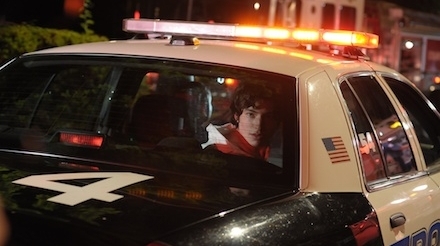Rich with cinematic life but existing doggedly in the shadow of death, Lynne Ramsay’s epically disquieting adaptation of Lionel Shriver’s bestseller is fluid and imaginatively realised. It's an emotional ambush, but executed with extraordinary precision. Steeped in a magnificent malice and caked in frosty beauty, We Need to Talk About Kevin deals with the lead up to and aftermath of a high-school massacre, and gives us every parent’s worst nightmare – spawning a monster.
In We Need to Talk About Kevin Tilda Swinton plays Eva, the mother of the titular antagonist. Though it darts back and forth in time, as the film begins proper Eva’s life is already in tatters; she lives in relative poverty and isolation, a pariah in her own community. Piece by horrible piece her teenage son’s crime, the fallout, her failings and nerve-shredding trials as a parent are disclosed to us. We are shown that, even as he gestated in her womb the connection between mother and child was eerily absent and, in a moment of memorable and illuminating anguish, we see her seeking solace from her screeching infant in the masking sound of a pneumatic drill.
From the outset Kevin is shown to be a wilfully difficult child, calculatingly and cruelly so, even during his younger years. It’s a film that asks difficult questions, encouraging us to both sympathise with and question Eva. We ask ourselves: is Kevin a sly child, is he an unpreventable beast, or is he acting-up in a vacuum of maternal affection? (His father - played by the ever genial and clueless John C Reilly - seems to possess an unquestioning affection for Kevin.) If you beat your child every day you might expect to raise a brute, but what if you simply don’t love it? Should we - as the local community so confidently and venomously do - place the blame squarely at Eva’s door?
 Constant reminders of Kevin’s crime terrorise Eva and bleed across the film, dripping and splattering red about the frame. Following the crime her modest white house is vandalised with red paint and her repeated attempts to clean it up leave her with the appearance of blood on her hands. The film opens in fact with images of Eva enjoying happier, more liberated and independent times, cavorting at La Tomatina (of all scarlet and mucky events) - a hideous but brilliantly lurid pre-echo of the horror that awaits her.
Constant reminders of Kevin’s crime terrorise Eva and bleed across the film, dripping and splattering red about the frame. Following the crime her modest white house is vandalised with red paint and her repeated attempts to clean it up leave her with the appearance of blood on her hands. The film opens in fact with images of Eva enjoying happier, more liberated and independent times, cavorting at La Tomatina (of all scarlet and mucky events) - a hideous but brilliantly lurid pre-echo of the horror that awaits her.
A perfect illustration of just how dynamically Eva’s discomfort and alienation is rendered occurs during a wonderful sequence in which Eva drives home amid the early evening Halloween festivities, accompanied on the soundtrack by the contrastingly upbeat strains of “Everyday” by Buddy Holly. The children’s fantastic costumes take on a terrifying dimension and it culminates with Eva being terrorised in her own home. This sequence - and the film as a whole - is shot through with its protagonist’s harrowed mindset, her paranoia and vulnerability.
We Need to Talk About Kevin is skin-crawling, gut-wrenching and thrillingly provocative
Swinton gives a performance of believable and wrenching exhaustion and pain, and it’s right up there with her best work. Kevin is played as a 15-year-old by newcomer Ezra Miller, and the young pretender faces-off against the mighty Tilda with genuine aplomb. Kevin is a cocksure brat, bristling with motiveless rage and frighteningly unknowable and Miller injects him with an unnerving dose of reptilian charisma.
Ramsay is a director of formidable talent who enlivens her (on the surface) bleak stories with visual poetry, disconcerting intimacy, prosaic horror and grace. Set on a neglected estate during the grime and infestation of a refuse collectors’ strike, her debut Ratcatcher (1999) attracted deserved attention and high praise for bringing sensitivity and imagination to its portrayal of a rough-and-ready Glaswegian childhood. Ramsay followed it up with the sublimely shell-shocked Morvern Callar (2002) in which Samantha Morton’s Morvern is reluctantly liberated by her partner’s suicide.
The excellent source novel tackles big, uncomfortable issues surrounding parental affection and culpability and Ramsay’s film adopts a consonantly bold approach. We Need to Talk About Kevin is skin-crawling, gut-wrenching and thrillingly provocative. In her third depiction of violent death and its ramifications, Ramsay continues to prove herself an audacious director, up to her elbows in the mire of life but, as always, emerging pristine and emphatically victorious.
- We Need to Talk about Kevin is on general release from Friday
Watch the trailer for We Need to Talk About Kevin















Add comment